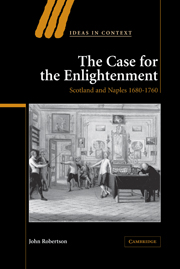Book contents
- Frontmatter
- Contents
- Preface
- 1 The case for the Enlightenment
- 2 Scotland and Naples in 1700
- 3 The intellectual worlds of Naples and Scotland 1680–c.1725
- 4 The predicament of ‘kingdoms governed as provinces’
- 5 Vico, after Bayle
- 6 Hume, after Bayle and Mandeville
- 7 The advent of Enlightenment: political economy in Naples and Scotland 1730–1760
- Conclusion: the Enlightenment vindicated?
- Bibliography
- Index
- IDEAS IN CONTEXT
5 - Vico, after Bayle
Published online by Cambridge University Press: 15 October 2009
- Frontmatter
- Contents
- Preface
- 1 The case for the Enlightenment
- 2 Scotland and Naples in 1700
- 3 The intellectual worlds of Naples and Scotland 1680–c.1725
- 4 The predicament of ‘kingdoms governed as provinces’
- 5 Vico, after Bayle
- 6 Hume, after Bayle and Mandeville
- 7 The advent of Enlightenment: political economy in Naples and Scotland 1730–1760
- Conclusion: the Enlightenment vindicated?
- Bibliography
- Index
- IDEAS IN CONTEXT
Summary
THE QUESTION OF VICO'S ‘CONTEMPORARIES’
Over October and November 1725 Giambattista Vico dispatched presentation copies of his newly published Princìpi di una Scienza Nuova (the New Science) to a number of friends, fellow men of letters, and potential patrons. In the letters which accompanied the book he expressed his hopes for its success, and took the opportunity to point out the targets against whom it was directed. Writing to one of his closest friends among the Neapolitan clergy, the Capuchin Father Giacco (then out of the city for health reasons), Vico contrasted the New Science with his previous works. Those had been written to demonstrate his suitability for the university chairs for which he had been a candidate; now that he had been judged unworthy of such positions, he had been free to write the new book as he chose, for the benefit of the few who were truly wise. With this work, he told Giacco, he felt as if he had dressed himself as ‘a new man’.
Another, much more distant recipient of a presentation copy of the New Science was Jean Le Clerc. In his accompanying letter Vico fulsomely thanked Le Clerc for his review of Vico's previous publications in his Bibliothèque Ancienne et Moderne in 1722; it was Le Clerc's favourable judgement which had encouraged Vico to continue with the new work.
- Type
- Chapter
- Information
- The Case for The EnlightenmentScotland and Naples 1680–1760, pp. 201 - 255Publisher: Cambridge University PressPrint publication year: 2005
- 1
- Cited by

